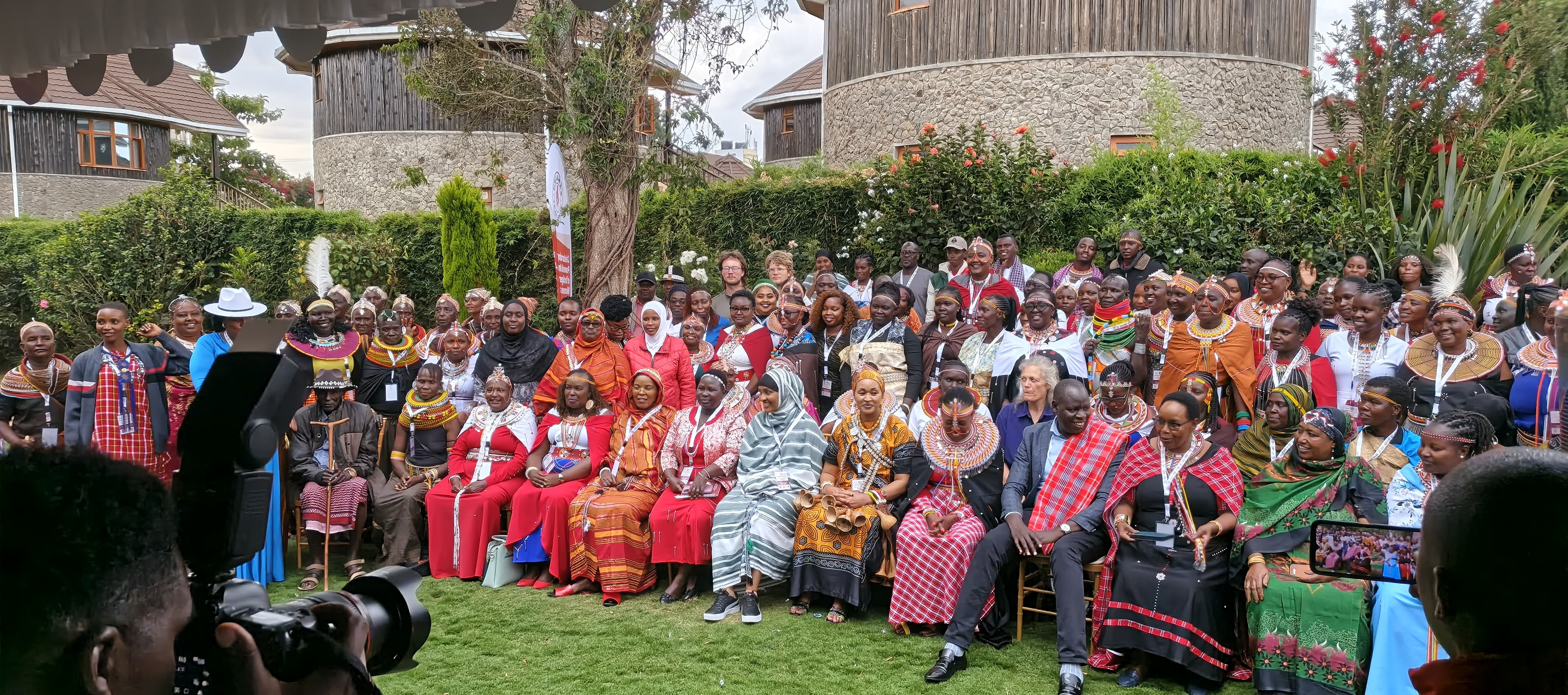
 Indigenous Women Council during the commemoration of international Indigenous Peoples Day and 10-years of their work in championing for women and girls’ rights./COURTERSY
Indigenous Women Council during the commemoration of international Indigenous Peoples Day and 10-years of their work in championing for women and girls’ rights./COURTERSY
Indigenous women have called for the compensation over human-wildlife conflict, displacement, and harm caused by extractives and mega infrastructure projects such as LAPSSET and British Army training operations.
Speaking in Nanyuki where they marked International Day of the World's Indigenous Peoples, the Indigenous Women Council of Kenya said this forms part of their call to action in ensuring the fast-tracking of implementation of resolutions to address historical injustices.
The women also called for the streamlining, decentralising and fast-tracking community land registration process to county levels to eliminate bureaucratic delays.
Further, they called for increased political representation by enforcing affirmative action policies to guarantee representation for Indigenous women, youth, and persons with disabilities at both national and county levels.
“Indigenous women call upon the state to recognise, honor, and deliver services in consultation with indigenous peoples, and to take urgent action in … Education Reform: Direct the Kenya Institute of Curriculum Development (KICD) to integrate Indigenous knowledge and harmful cultural practice awareness into school curriculum.
“Gender Justice: Establish and adequately staff gender desks in police stations located in Indigenous territories, prioritising GBV and FGM cases,” Jane Meriwas, the executive director of Samburu Women Trust and IWC convenor said.
The event in Nanyuki brought together some 300 Indigenous women leaders from Kenya, Uganda and Tanzania to commemorate International Day of World’s Indigenous Peoples and mark 10-years of their work as IWC.
This year's global theme is "Indigenous Peoples and AI: Defending Rights, Shaping Futures". Meriwas said the theme underscores a new frontier of struggle in ensuring they are not excluded or exploited in the digital age.
“Central to this is Indigenous Data Sovereignty: the right of Indigenous Peoples to govern, control, and protect data that pertains to their cultures, lands, languages, and bodies,” she said.
Meriwas noted that women are reclaiming indigenous seeds, the youth are organising around water as a right, not a commodity, while community elders are restoring traditional governance systems to protect communal lands.
“What sustains us is not just advocacy-it is memory, and the moral clarity that this struggle is not for us alone. It is for those not yet born. Let us be the generation that did not break the chain of responsibility. The land remembers. The water listens. And the climate waits."
Participants drawn from different groups also voice the various challenges they face.
For instance, Rose Resiato and Florence Ntisai who represented indigenous women with disability said despite progress, they still face systemic problems, particularly discrimination, including in health, and education.
Youth representative Silvana Lesuuda they are still dealing with discrimination in land rights, erosion of culture and language as well as mental health.
“We urge the government to enforce inclusion of youth in governance,” Lesuuda said.
National Land Commission CEO Tache Kabale said NLC has prepared a recommendation for the review of the land governance policy to ensure there is inclusivity of youth, PWDs and women from the indigenous communities.
Grace Lolin, Chairlady Indigenous Women Council, urged the participants to continue building bridges and have a collective responsibility to champion for the rights of indigenous women and girls.
In his message on the day, African Union Commission Chairperson Mahmoud Ali Youssouf reaffirmed AU’s commitment to promoting and protecting the rights of indigenous peoples.
These rights are enshrined in the African Charter on Human and Peoples’ Rights (1981) and guided by the African Commission on Human and Peoples’ Rights’ Working Group on Indigenous Populations/Communities. Youssouf underscored the indigenous people’s vital role in preserving cultural diversity, safeguarding the environment, and advancing sustainable development.
He urged AU member states, partners, and stakeholders to ensure indigenous voices are heard, their rights upheld, and their contributions fully valued in building a more inclusive, just, and sustainable Africa.
This, he noted, can be attained through inclusive policy-making, equitable resource-sharing, and respect for traditional knowledge systems.
The AU Executive Council at its 47th Ordinary Session urged members to strengthen measures to protect indigenous peoples’ rights, and reaffirmed its support for the UN Declaration on the Rights of Indigenous Peoples (2007) as a global normative framework complementing AU instruments.
At the UN level, Secretary General Antonio Guterres termed the indigenous peoples as guardians of ancient knowledge, defenders of cultural heritage, stewards of biodiversity, and essential to the world’s shared future.
Speaking on this year’s theme, Guterres warned that while AI can help preserve endangered languages and oral histories, map ancestral lands, and amplify Indigenous wisdom to fight climate change, without the meaningful participation of Indigenous Peoples, it risks perpetuating old patterns of exclusion, misrepresenting cultures, and violating fundamental rights.
“We must ensure AI is developed and governed in ways that are inclusive, ethical, and just. That means removing barriers to new technologies for Indigenous Peoples, protecting their data sovereignty and intellectual property rights, and supporting their meaningful inclusion in the application of AI,” he said.
The UN General Assembly on December 23, 1994 set August 9 as International Day of the World's Indigenous Peoples.
The date marks the first meeting of the UN Working Group on Indigenous Populations of the Sub-Commission on the Promotion and Protection of Human Rights in 1982.
The UN estimates there are 476 million indigenous peoples across 90 countries.
While they make up less than five per cent of the global population, they account for 15 per cent of the poorest.











